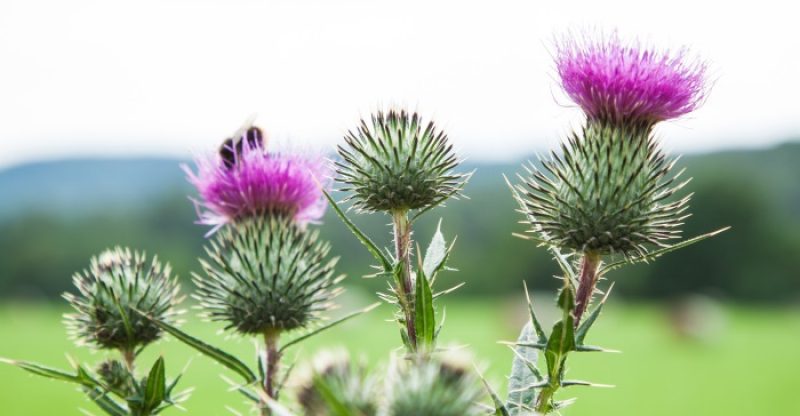15 Evidence-Backed Health Benefits of Milk Thistle
What is Milk Thistle?
If you’ve ever wondered, “What is milk thistle?” then you’ve come to the right place.
Milk thistle is an incredible plant with a wide variety of uses, some of which have only recently been discovered.
This article contains all of the most recently-studied effects of milk thistle and is up to date, so make sure you check out all the benefits milk thistle has to be well-informed on the new research.
Milk thistle is a plant in the Asteraceae family and can be identified by its beautiful purple and red flowers and thin spindly leaves that surround the blooming bud.
It was originally only found in Southern Europe and some of Asia but is now cultivated all around the world.
The plant can grow to be anywhere from a foot to 79 inches tall and has been used in traditional medicine as a treatment for various forms of toxicity.
Its use as a liver elixir can be associated with the presence of a chemical called silymarin.
When milk thistle extract is taken from the seeds of the plant, silymarin offers a potent mixture of compounds that can help decrease your body’s toxicity, as well as provide a number of other benefits.
Other milk thistle benefits are associated with its antioxidant and anti-inflammatory characteristics.
It is an excellent aid for those concerned about free radicals and general health.
It can also boost the immune system, and even prevent infection.
Milk thistle can help protect your body’s most important organs, such as the heart and liver, and can make an excellent addition to a healthy lifestyle and diet.
Milk Thistle History
The earliest uses of milk thistle may date back as far as the first century when a Roman naturalist discovered that the plant had medicinal properties.
It was soon discovered by a doctor in the Roman military that the plant could be given to those bitten by snakes and their chances of survival would increase substantially.
This is due to the plant’s toxin-purging nature, allowing the patient’s liver to filter out the venom before they died from it.
By the 19th century, the understanding of milk thistle and its benefits had become more scientific.
A German physician was able to develop a tincture of the plant’s seeds, which as we know today is a highly-effective method of extracting the active ingredients from the plant.
This tincture was very successful at aiding patients who had toxicity, liver damage, or needed intestinal cleansing.
Modern research has led scientists to uncover a whole host of new uses for the plant and its extracts.
In lab conditions, milk thistle has shown potential as a treatment not only for issues with the liver related to toxicity but as a mitigator of the damage from various types of poisoning, as well as the symptoms of hepatitis and occupational chemical exposure.
How and Where Milk Thistle Grows
Milk thistle was originally native to the Southern area of Europe, as well as parts of Asia.
It was most popular as a supplement to traditional German medicine (2) but has been reputed for its benefits among inhabitants of the region for an estimated 2000 years.
A majority of the world’s supply of milk thistle still comes from this region, is predominantly produced in Austria, Germany, and Poland.
The plant is sown each year in March and April and is then harvested in a two-step process in August.
It takes about two weeks after the plant flowers for it to be ready for harvest.
Despite most milk thistle coming from its traditional home in Europe, a large amount is also cultivated abroad.
In many places, it is considered an invasive weed and can do real damage to foreign ecosystems if left unchecked.
China and Argentina are the two major suppliers of milk thistle outside of Europe and are good examples of the plant’s resiliency and ability to thrive in nearly any climate.
Interesting Facts
Many of the traits of milk thistle extract are still not fully understood, but it has become one of the most-studied botanical plants of the past five years.
The action mechanism of the flavonoids and lignans that help to cure toxicity and liver damage are clearly understood, but some of the tertiary effects of the plant are still an enigma.
For example, milk thistle has long been used as a way to ensure the quality and volume of breast milk produced by nursing women (3).
This effect has been observed in lab conditions and has been proven to be statistically significant.
Research has yet to uncover how the plant induces this change, and scientists are still seeking to understand the phenomenon.
Another interesting element of milk thistle is that it has been studied as a way to boost the immune systems of people with wasting diseases.
This research has been applied specifically to patients with HIV who are at a tremendously-elevated risk of experiencing a severe case of an otherwise minor ailment.
It is not yet fully understood how milk thistle helps boost the immune system, but future research could yield valuable results.
Nutritional Facts
Milk thistle extract contains no calories and is refined so that it only delivers the active components.
This means that taking a concentrated supplement won’t cause you to gain any weight or have any ill effects on your diet.
In fact, milk thistle has been associated with a loss of fat mass (5).
Some people prefer to avoid the refined option and opt for a more direct source.
Eating the seeds plain is one option, and doing so provides not only the benefits from the active compounds that can be extracted from the seeds but also some nutrients and fiber that you won’t get from an extract.
For every two tablespoons of seeds you consume you get 10 calories and two grams of carbohydrates.
One of these two grams comes from dietary fiber, so for people counting carbs, the seeds only have one gram of net carbs.
The plant itself, including the bud, leaves, and stem, is edible but very bitter and not recommended.
These parts of the plants are also low in the active ingredients that most people consuming milk thistle want, making them less than ideal for consumption.
Health Benefits of Milk Thistle
Protects the Liver
At the top of the list of milk thistle’s uses is its protective properties for the liver.
This was one of the earliest known uses for milk thistle.
Recent research has shown that the extract from milk thistle seeds can be used to improve the indicators of liver damage in people with long-term liver damage caused by prolonged exposure to alcohol (7).
Milk thistle is so effective at protecting the liver, in fact, that when taken after receiving a liver transplant it has been shown to improve patient health (8).
The mechanism for this is thought to be twofold.
First, the active compounds in the milk thistle help the liver repair itself, so the damage done to the organ during the surgery heals more quickly, leading to fewer complications.
In addition, the milk thistle allows the patient’s body to process more efficiently the medications they are given, synergistically amplifying the plant’s healing effects.
Can Inhibit Fat Cell Formation
In recent studies, milk thistle has been shown to alter one of the most intensively-studied cellular processes in the body, fat cell differentiation (9).
This is the process by which cells in your body can decide to become fat cells.
Milk thistle has several effects on the internal chemistry of your body that cause it to be much more difficult for new fat cells to form.
This leads to a scientifically-significant correlation between milk thistle supplementation and a decrease in fat tissue.
The way milk thistle accomplishes this is thought to be by increasing chemicals called insigs early on in the fat cell differentiation process.
By exposing the pre-adipose cells to an elevated level of both insig-1 and insig-2, the cells are queued to remain in their pre-adipose state instead of turning themselves into more fat.
This can help not only those trying to lose a few pounds but also people with visceral fat disorders such as a fatty liver.
Promotes Healthy Iron Levels
In your body, iron is used to activate a compound in the blood called hemoglobin.
This is the molecule responsible for your blood’s ability to grab oxygen from the lungs and carry it throughout the body.
Obviously, since every part of your body requires a constant and steady supply of oxygen, this is an incredibly important task.
Your body can, however, have too much iron.
This is a condition usually called hemochromatosis, and it can lead to very serious complications if left unchecked.
Milk thistle has been shown to reduce the levels of blood iron in those who have dangerously high ones.
This is because most often the extra iron is stored in the liver, where it is released too quickly if your body’s reserves are overloaded.
By allowing the liver to cleanse itself more efficiently, the extra iron can be safely flushed out more than the body would be able to without the aid of milk thistle (11).
Milk Thistle is an Antioxidant
The active compounds in milk thistle have been shown to be powerful antioxidants.
Supplementing with an extract taken from the seeds of the plant has improved markers of oxidization in the body, including superoxide dismutase, glutathione peroxidase, total antioxidant capacity, and even a compound called hs-CRP that is important in the treatment of diabetes (12).
In the body, antioxidants play a role similar to that of antibodies by repairing or destroying free radicals.
Free radicals can also lead to or exacerbate a number of other ailments, namely diabetes (13).
Milk thistle also activates what is called heat shock proteins, which act not only as antioxidants but also improve the immune system and the body’s reaction to stress.
This has a synergistic effect on the body, leading to the creation of fewer new free radicals.
Anti-Inflammatory Properties
This is one of the more recent discoveries from scientific studies on milk thistle.
This miraculous plant has recently been shown in studies performed on mice to have incredibly potent anti-inflammatory properties (14).
The original study was done on the effects on the plant on pre-term birth and was found to reduce greatly the inflammation associated with this period in the female mice.
This research was soon applied to human studies, and it was found that the plant inhibited the release of hydrogen peroxide and the production of an inflammatory precursor called TNF-alpha.
These studies were first performed on isolated human cells in lab conditions, then later performed on healthy adult patients (15).
In both studies, the results were the same and led to significantly-reduced inflammation in the recipient.
This could potentially help people with allergies triggered by minor inflammation, or those with arthritis that is made worse by it.
Works Against Radiation-Induced Cellular Damage
This is yet another application for milk thistle that has only recently been discovered, thanks to lab mice.
The study was done on mice that had lung cancer and that were being given radiation treatments to fight the spread of the disease.
The rats were broken into groups; some were given a placebo, some were given traditional chemo drugs, and some were given various experimental treatments (16).
One of the experimental treatments the researchers were testing was to give the mice milk thistle in conjunction with their radiation therapy.
The belief was that perhaps the antioxidant properties, along with the toxicity-purging abilities of the plant extract, would be able to prevent some damage to the tissue of the lungs that was being exposed to radiation.
The researchers found that this was indeed the case and that the extract given to the mice was able to reduce the inflammation and fibrosis associated with exposure to radiation, as well.
The survival rate of the mice in the study increased dramatically (17).
This particular study has not yet been replicated in human subjects, but the research shows a lot of promise.
Improves Breast Milk Production
This is another one of the very early uses for milk thistle and may be partly where it got its name.
The plant has been known for a very long time to be capable of increasing the volume of milk produced by nursing women (18).
A wide variety of factors can affect the production of milk in new mothers, including illness, stress, returning to work too early, and even physical pain levels.
A number of pharmaceutical and natural options are available to nursing women that claim to increase the quality and quantity of breast milk.
However, most of these options also pose the risk of being passed on to the infant in the milk, and the effects this may have are unknown.
Milk thistle, on the other hand, is known to be safe for nursing women, and won’t cause any harm to the baby receiving the milk.
It has been thoroughly studied and is the only proven herbal remedy that can increase milk production safely (19).
Can Help Fight Infections
While being studied as a way to mitigate the damage done to the liver by Hepatitis-C, scientists discovered that the patients receiving milk thistle supplement experienced an antiviral effect (20).
The milk thistle was able to slow, and in some cases even stop, the spread of the hepatitis infection.
This research has huge implications in a world where prescription antiviral and antibiotic medications are being overprescribed, and some germs are developing an immunity to them.
This research is currently being applied to patients with HIV and even influenza (21).
Its ability to stop RNA and protein synthesis in the invading microbes, and thus their inability to reproduce or spread in the host’s body, was attributed to its antiviral and antibiotic effects (22).
Might Be a Nootropic
Nootropics are a category of supplement that has been gaining a lot of popularity and attention over the last year, and rightfully so.
Nootropics include both pharmaceutical medications and natural herbal supplements, but all share the same goal, which is to improve your cognitive capabilities.
Whether that be your memory or how quickly you can think, these compounds are supposed to make you smarter.
Interestingly enough, milk thistle has shown potential as a nootropic supplement.
In some experiments, supplementation with milk thistle was found to reduce existing memory damage in mice, helping them recover memory that was previously lost due to brain damage (23).
Milk thistle was also proven in lab conditions to enhance the function of the hippocampus in rats, and reduce the production of one of the major contributors to the progression of Alzheimer’s (24).
The cognitive effects of milk thistle in healthy human adults have not yet been studied, but the existing body of research shows a lot of promise for the treatment of mentally degenerative disorders.
Improves Bone Health
Bone health is incredibly important.
You have to be especially careful of your bone health if you’re a woman over 30 since this is when the early signs of osteoporosis will typically begin to appear.
Milk thistle has shown the potential to be able to help with this, as well.
In studies, milk thistle has been proven to increase bone mineral density, which is the most important metric when measuring bone health (25).
If your bone mineral density is within healthy levels, then you are at a much lower risk of suffering a broken bone.
Milk thistle improves bone health by both triggering the body to produce more new bone and preventing it from dissolving old bone as quickly (26).
Both of these functions are perfectly natural and healthy for your body, but they must be done in the right balance and at the right speed.
Otherwise, the bones could weaken or become brittle, and be much more prone to breaking. Milk thistle helps to balance these processes.
Can Prevent or Treat Cancer
It is known that leukemia affects the liver, and people with this particular form of cancer will experience substantially elevated liver toxicity.
Milk thistle can reduce these symptoms of leukemia (27).
Milk thistle can also help people with other forms of cancer.
It has been shown to reduce lipid metabolism markers that are associated with prostate cancer, as well as cholesterol in men who have already had their prostate removed (28).
Supplementing with milk thistle can also help for patients who are receiving radiotherapy.
When given to breast cancer patients undergoing RT, there was a significant reduction in the occurrence of skin lesions due to the exposure to radiation (29).
Of course, if you are receiving RT, then it is best to discuss any supplementation with your doctors before beginning treatment.
Anti-Diabetic
Not only is milk thistle anti-inflammatory and an antioxidant, but it also shows potential to act as an antidiabetic.
In adults with diabetes, long-term supplementation with milk thistle was able to lower insulin dramatically (30).
This led to the patients using less insulin, and some even saw a full recovery from their condition.
Good diet and exercise are still essential for best results, of course, but milk thistle has proven that it can be a great help to people who have type 2 diabetes.
Good for Your Heart
Milk thistle is cardioprotective, which means that it is able to protect your heart from much of the damage of everyday life.
Taking milk thistle seed extract allowed the body to block a chemical called isoproterenol, which is responsible for much of the wear and tear the heart sees every day (31).
The studies on this were performed on a variety of animals and found that by blocking the effects of isoproterenol both in the heart and elsewhere, milk thistle was potentially able to have enough of an effect to improve longevity.
The active compounds in milk thistle not only seemed to mitigate some of the damage that the heart accumulates over time but were also successful in increasing the amount of healthy activity in the heart.
Milk thistle was able to promote better circulation and a healthier heart rhythm in patients by increasing mitochondrial function (32).
Powerful Detox
Arguably the most widespread and important use of milk thistle is its ability to remove chemicals and toxins from the body.
No juice cleanse or trend diet is capable of reproducing the potent results milk thistle is capable of when it comes to purging your body of potentially-harmful compounds.
Milk thistle has been repeatedly proven to be effective in treating a variety of different types of toxicity.
Milk thistle is effective against various kinds of poisoning, including snake bites and mushroom poisoning (33).
It can work to rid the body of carcinogens as well, one of the leading causes of cancer in all age groups (34).
The modern lifestyle exposes us to large amounts of toxins simply from the air we breathe and the food we eat.
That is why almost everyone should be supplementing with milk thistle, to aid their body in getting rid of these harmful poisons that we incidentally absorb every day.
Dosage and Interactions
Now that you’re probably sold on this potent botanical’s healing properties, you’re probably wondering what the proper milk thistle dosage is.
This depends upon which of the milk thistle benefits you’re planning on using it for, and what type of milk thistle you’re using.
Most people will opt for a standardized extract that contains somewhere between 70 and 80 percent active compounds.
If taking the oral route with this kind of extract, the right milk thistle dosage will be around 1 gram a day for most people looking to get general wellness benefits (35).
If one of the other milk thistle’s uses is more interesting to you, then you may need a little more per day to see the maximum benefits.
If you’re looking to use milk thistle for heart health, diabetes, or for prostate health, a second one-gram dose should be taken each day, bringing your total daily intake up to 2 grams (36).
While milk thistle side effects are generally rare, they do occur and are important to watch out for.
Milk thistle side effects include:
- Gastrointestinal Issues: as with practically anything you consume, milk thistle has the potential to upset your stomach and cause nausea, diarrhea, bloating, or gas (37).
- Skin Reaction: in some people, milk thistle has been reported to cause a minor rash.
- Psychological Effects: anecdotal evidence shows that milk thistle can cause a change in mood, giving some people a sense of anxiety or malaise, and exacerbating insomnia in others.
- Rhinoconjunctivitis: this is a term for general issues regarding the sinuses, as milk thistle can cause some people to have a runny nose or begin to sneeze as if they are having allergies.
How to Add More to Your Diet
While some people use the plant of milk thistle to cook with, this is not typically the recommended way to receive all of the benefits the plant has to offer.
The stem, leaves, and flowers of the plant are very bitter, and actually, contain relatively low concentrations of the active compounds that give the plant its healing properties.
The seeds are the part of the plant highest in flavonoids and lignans and are what you should use if you want to get the most out of milk thistle.
While the seeds are potent and offer strong medicinal properties, extracts are even more powerful.
This is how most people usually choose to supplement with milk thistle.
Extracts will most often contain somewhere between 70 and 80 percent by weight of the active compounds found in the seeds.
This means that with one or two small capsules a day you can take in as much of the healing milk thistle ingredients as if you had eaten a large salad prepared entirely with the bitter herb.
Precautions
Milk thistle is a great addition to a healthy lifestyle with proper diet and exercise, but cannot act as a replacement for either of those.
This wonderful plant can do a lot to improve your health and well-being, but not without the proper foundation of a healthy lifestyle.
It is also important to discuss any supplementation with your doctor before beginning it if you are on any kind of medication or have any existing health issues.
This article may not be comprehensive when it comes to possible interactions or side effects in those who are on medications or receiving other kinds of treatment.
Milk thistle also cannot act as a replacement for medication if you suffer from one of the illnesses mentioned in this article.
Finally, it is important to ensure that you are getting your milk thistle from a reliable source.
Some manufacturers supply weaker extractions, and some use processes that extract other beneficial compounds from the plant.
Trying out different brands can help you find one with the right potency and mix for your body chemistry.
FDA Compliance
The information on this website has not been evaluated by the Food & Drug Administration or any other medical body. We do not aim to diagnose, treat, cure or prevent any illness or disease. Information is shared for educational purposes only. You must consult your doctor before acting on any content on this website, especially if you are pregnant, nursing, taking medication, or have a medical condition.
HOW WOULD YOU RATE THIS ARTICLE?






